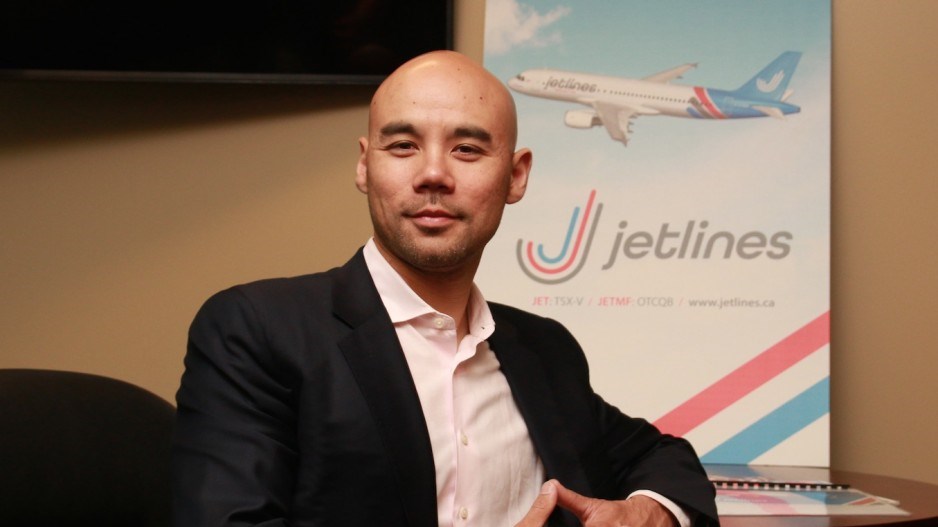More than four years after Vancouver-based Canada Jetlines pitched a plan to launch an ultra-low-cost carrier (ULCC), the venture is again readying to get off the ground, although executives have yet to set a firm takeoff date.
This is despite one competitor, WestJet-owned Swoop, launching on June 20, and a second, Flair Airlines Ltd., on June 14, closing its charter service and relaunching as a ULCC with regularly scheduled flights. Calgary-based Enerjet, meanwhile, continues to fly charters but has floated the idea of evolving to become a ULCC.
As ULCCs gain ground, they could put pressure on pricier mainstream airlines. The popularity of ultra-low-cost airfares was also cited as one of the reasons that Greyhound Canada plans to halt bus service in B.C.
Despite increasing competition in the sector, it’s important to take the time to get things right before launching, Jetlines' chairman Mark Morabito told Business in Vancouver.
“We don’t view first-mover advantage as being the critical element that a lot of people think it is.”
But Morabito acknowledged that the entry of other carriers into the market complicates matters, saying he thinks that WestJet created Swoop to make it harder for other ULCCs to launch and become profitable.
“It’s a purpose-built competition killer,” Morabito said. “But they’re not going to be able to make money because their costs are higher.”
WestJet told BIV that Swoop’s flight attendants and pilots will be designated as employees of the spinoff company, and that Swoop will have a lower overall cost structure than WestJet. Jetlines intends to have non-union staff, while both Swoop and Flair have unionized employees.
Flair CEO Jim Scott countered by telling BIV that having unionized staff does not mean that his airline has higher costs, but rather that it has happier workers.
“The secret [in the airline business today] is to get a good agreement, not to keep unions out,” said Scott, who was Jetlines’ CEO until June 2017.
Morabito’s King and Bay Management Corp. has been Jetlines’ largest shareholder for years, and he is largely responsible for the rotating door of top executives that the company has experienced in the past several years.
Morabito had what he called a “difference in philosophy” with Scott, who was Jetlines’ CEO until June 2017. That dispute centred on what kind of planes to use.
Scott wanted to use less expensive Boeing 737-400 planes that were on average about 27 years old and incapable of flying between Hamilton, Ontario, and Abbotsford against the wind without stopping somewhere to refuel. Morabito wanted to use more expensive Airbus A320 aircraft that were about 12 years old and could make longer non-stop trips but would require more flying time per day for the airline to break even.
Both men remain cordial, with Jetlines waiving Scott’s non-compete clause to allow Scott to take the top job at Flair. Morabito said Scott’s presence heading a competitor will not hurt Jetlines.
Flair flies seven older Boeing 737-400 planes and is looking to buy two newer planes, Scott said.
Morabito recruited Stan Gadek as a board member in 2016 and then appointed him CEO when Scott left seven months later.
In June, Morabito recruited a new CEO, Lukas Johnson, who held progressively senior roles during eight years with U.S. budget carrier Allegiant Air. Gadek remains with Jetlines as a consultant.
Morabito and Johnson each separately told BIV that the company will keep its headquarters in Vancouver and operate flights out of Abbotsford International Airport.
“I’m going in with a fresh look at a lot of the business model,” said Johnson, who has a $700,000 equity stake in the airline. “I’d like to re-evaluate, not the business model of it being a ULCC, but some of the route structures and where we think we have the best opportunities.”
Gadek told BIV last year that he expected all pilots and flight attendants to be based outside B.C., in places such as Hamilton.
Johnson declined to say where he expected the workers to be based but said that his company will hire “at least 60 crew members – pilots and flight attendants” several months before the flights start, to allow time for employee training.
“Ticketing staff at airports will likely be subcontracted out but it will be our own staff that are flying the planes and serving the planes and planning,” Johnson told BIV.
Jetlines recently signed a definitive lease agreement for two Airbus A320 aircraft to be delivered in the first half of 2019. Once those planes are delivered, the airline will launch, Johnson said.
“You don’t buy planes to have them sit around."
@GlenKorstrom



